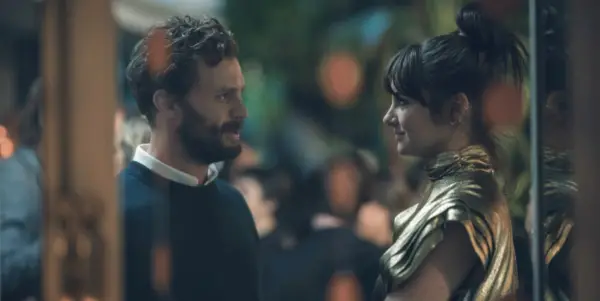Around the midpoint of Endings, Beginnings, Daphne (Shailene Woodley) and Jack (Jamie Dornan) decide to cover up the subtitles of the foreign film they’re both watching and make up what the characters are saying. They rattle off nonsensical dialogue in a humorous bit, but the scene echoes the movie itself in a much more serious manner — highlighting the improvisational acting that forms the core of the story. The latest film to come from director Drake Doremus, Endings, Beginnings follows Daphne after she breaks 0ff a long-term relationship, and tumbles into the arms of Jack and Frank (Sebastian Stan). The three adults become entangled in a love triangle that is equal parts passionate and destructive, seemingly doomed from the start.
As Doremus recently told Film Inquiry, the film is as much his film as it is Stan‘s, Woodley‘s, and Dornan‘s, a collaboration between actor and director in the purest sense –“we always leave a little room for the actors to kind of make it their own, and bring their life into it. Bring all of our souls into it and mix it together essentially”. The result is a deeply personal project that strives for profound emotional impact, but unfortunately falls short.
Love In The 21st Century
Doremus has long been fascinated with how relationships function in the context of modern technology and conventions (his 2017 feature Newness being the most direct exploration of it), and Endings, Beginnings is no exception. Many of the interactions between Daphne and her lovers occur over text, with the messages displayed onscreen in messy, brightly colored font. In fact, Frank’s first message to Daphne is a link to a hand-crafted Spotify playlist, a distinctly modern love language if there ever was one. But these texts also further complicate things. Daphne is able to message each man unbeknownst to the other, and confusion and hurt ensues.

They each fill out distinct roles in her life; Jack is comfort and safety, and Frank is excitement and recklessness. It’s even displayed through their sexual interactions — Daphne engages in missionary with Jack beneath clean, white sheets while, later, she and Frank f*ck roughly on the floor in front of Jack’s dog (a definite “ew” moment). It’s a back-and-forth that can’t last but that Daphne is intoxicated by. When her friend tells her that one day she’ll find “the one”, she shyly suggests that maybe she’s found two people to fill that post. It’s a hint at polyamorous or open relationships, both fairly modern concepts, though it’s not something that’s entertained for very long when things start to go south.
Unclear Emotions
It’s clear from the start that Daphne’s past has left her broken. Moments from her relationship with her ex Adrian (Matthew Gray Gubler) as well as a drunken night with her old boss flicker onscreen from time to time like fleeting memories but are never fully explained. When she meets Jack and Frank there’s a lingering conviction that she may be able to heal through them, these two sparkling new individuals who are equally infatuated with her, and it’s this hope that leads her to pursue both relationships against her better judgment.
But it’s difficult to feel the impact of the emotional turmoil Daphne undergoes when the time devoted to the cause of it is wasted. The film itself is largely plotless already, but to add to that, the conversations between characters and general events that occur are very loosely documented — improvised, meandering dialogue further muddling things. The deep ennui of the film severs any hope of actually connecting and caring about these individuals as it drowns itself in melancholy and refuses to let the viewer breathe. There’s peeks of points of importance in these characters’ lives — Daphne’s art, for instance, which is her livelihood and clearly something that fuels her, but is very briefly mentioned — but nothing more than a glimpse. The film is more interested in observing Daphne looking sad in low lighting as Beach House plays in the background than genuinely developing her personality and motivations.
Endings, Beginnings: Conclusion
As is with most of Drake Doremus‘s projects, Endings, Beginnings seems to be an illuminating experience for the actors involved, but an aimless drag for audiences watching. Shailene Woodley‘s effort at making sense of the awkward writing pays off in further establishing her skill in playing emotionally nuanced roles, but is unable to save the movie as a whole. The film has all the messiness of life and love in the real world but none of the heart.
What do you think of Endings, Beginnings? Let us know in the comments below
Endings, Beginnings was released on digital on April 17, 2020, and is available on iTunes, Amazon, Fandango and Vudu.
Does content like this matter to you?
Become a Member and support film journalism. Unlock access to all of Film Inquiry`s great articles. Join a community of like-minded readers who are passionate about cinema - get access to our private members Network, give back to independent filmmakers, and more.